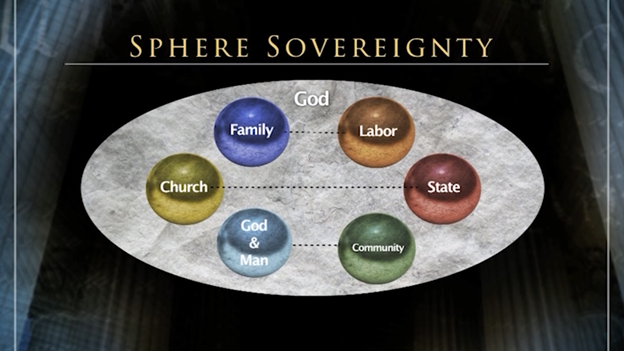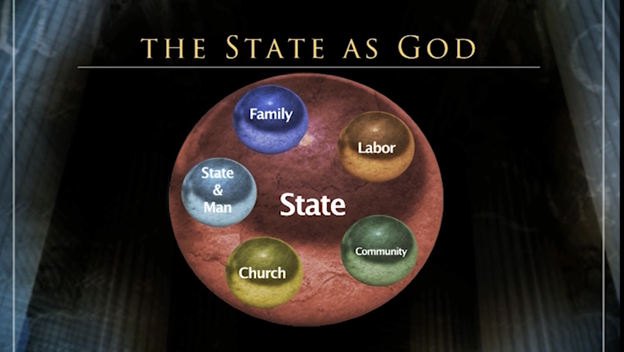This post is part 9 of a 12 part series about The Truth Project, an in-depth Christian Worldview experience led by Del Tackett and published by Focus on the Family.
In this tour, Dr. Del Tackett takes on the sphere of the state. This sphere, Tackett warns, can grow to become the most menacing of the spheres because of its propensity to usurp the authority from other spheres – especially the authority of the family and church.
Tackett begins the discussion about the state with a parable (though it could just as well have been a true story). He talks about a promising young couple, James and Heidi, who married, saved up, and bought a “picture farm”. They had children and everything seemed to be going well until tragedy struck. This couple was unfortunately killed in an auto accident. After the accident, while the rest of the family was in mourning, a gang of armed men descended upon the house and proceeded to take away half of the family’s possessions. The gang took half of the cattle, half of the crops, and everything else. Everyone who answered in the classroom agreed that this seizure of property was stealing.
Then Tackett added a twist. He says that instead of a renegade gang, it was instead the governor who ordered the seizure. In fact, that is the situation in our country at this moment: the government can actually seize half the assets of a dead man and nobody can legally object. Asking a boundary question like “can the state steal?” helps us to identify the proper jurisdiction of the state before God.
Biblical Case for the State Under God
To help answer whether the state can steal, Tackett reads through the account of Naboth’s vineyard in 1 Kings 21. The entire passage is worth the read, but here is the summary. King Ahab of Israel wanted to own a particular vineyard that Naboth owned. He offered Naboth a handsome price for the vineyard and Naboth refused it. So Ahab sulked and his wife Jezebel comforted the king with the thought she could still get the vineyard for Ahab. Jezebel conspired against Naboth, set false accusers before him at a feast in his honor in the king’s name, and thus incited the people to kill Naboth. Once Naboth was dead, Ahab seized the vineyard he had coveted. Then God sent the prophet Elijah to condemn the king’s wicked act.
This account reminds us that kings can do evil and sometimes commit wicked acts. And they are not justified in their actions before God. That tells us that even states are subject to God’s laws. But we don’t find the state is subject to God only in 1 Kings. We find several passages in Scripture that teach how God rules over the affairs of people through governments.
- Daniel 4:34-35: “At the end of the days I, Nebuchadnezzar, lifted my eyes to heaven, and my reason returned to me, and I blessed the Most High, and praised and honored him who lives forever, for his dominion is an everlasting dominion, and his kingdom endures from generation to generation; all the inhabitants of the earth are accounted as nothing, and he does according to his will among the host of heaven and among the inhabitants of the earth; and none can stay his hand or say to him, ‘What have you done?’”
- Proverbs 16:9-10: “The king’s heart is a stream of water in the hand of the Lord; he turns it wherever he will.
- Romans 9:17: “For the Scripture says to Pharaoh, “For this very purpose I have raised you up, that I might show my power in you, and that my name might be proclaimed in all the earth.”
In these passages, we see that the state is not independent from God. In fact, God rules over the nations in an invisible way. It can be seen most succinctly in Daniel’s prayer, “he removes kings and sets up kings” (Daniel 2:21).
Abraham Kuyper’s Sphere Sovereignty
Tackett has been using the term “sphere sovereignty” to delineate responsibilities between each social “sphere” God instituted. This concept is not original. The Dutch Christian and Prime Minister, Abraham Kuyper (1837-1920) developed the term in response to the government’s encroachment into education. Though Kuyper did not identify all the spheres that God has ordained, he highlighted a paradigm through which we could understand social institutions.

Within this biblically-inspired paradigm, spheres should remain relatively independent. However, when one sphere aims to take over the jurisdiction of another sphere, problems develop. For instance, when the sphere of the state aims to take over responsibilities from the family, then the family suffers and the state outgrows their God-ordained dominion.
The biblical illustration where the state overreached into the “church” sphere was in 2 Chronicles 26. In this account, Uzziah was the king of Judah. He was a good king and reigned for 52 years in Jerusalem. However, he became proud and decided to burn incense, which was the priests’ role. As a result, the priests led by Azariah condemned the king and the king was immediately judged by God with leprosy for his parlay into priestly duties. Uzziah died a leper.
In this account, we see a time when the state (King Uzziah) overreached his God-ordained role of leading the nation, by attempting to exercise the church’s role (Levitical priests). God judged him for this overreach and he was summarily removed from power.
Obeying the State as a Delegated Authority – Romans 13
Citizens of the state also have a particular role in the sphere of the state. The Apostle Paul outlined some of the responsibilities of citizens in Romans 13:1-7 where he wrote:
“Let every person be subject to the governing authorities. For there is no authority except from God, and those that exist have been instituted by God. Therefore whoever resists the authorities resists what God has appointed, and those who resist will incur judgment. For rulers are not a terror to good conduct, but to bad. Would you have no fear of the one who is in authority? Then do what is good, and you will receive his approval, for he is God’s servant for your good. But if you do wrong, be afraid, for he does not bear the sword in vain. For he is the servant of God, an avenger who carries out God’s wrath on the wrongdoer. Therefore one must be in subjection, not only to avoid God’s wrath but also for the sake of conscience. For because of this you also pay taxes, for the authorities are ministers of God, attending to this very thing. Pay to all what is owed to them: taxes to whom taxes are owed, revenue to whom revenue is owed, respect to whom respect is owed, honor to whom honor is owed.”
In this passage, Paul outlines part of the relationship between the citizen and the state. He speaks of the delegation of authority from God to the state. He speaks of the submission of the citizens to the state. He also speaks about the dual-purpose of the state: to punish evil and to condone good. And since the civil government is charged to punish evil and condone good, authorities must know what good and evil are.
The State’s Capacity for Evil
One tendency in civil government that happens without God is the growth of the power of the state. As the state’s power has grown, so also does its capacity for evil. As Western Civilization has deteriorated in its view about God and biblically-based morality, barbarity has ensued. Consider the Holocaust perpetuated by Nazi Germany, or the tens of millions killed by the Communists in Russia and Eastern Europe. Lest we think our power hasn’t corrupted us in America, we must never forget the tens of millions killed by abortion in the United States. To help enumerate the atrocities in the growth of the state in the last century, R.J. Rummel wrote,
“During the first eighty-eight years of [the 20th] century, almost 170 million men, women, and children have been shot, beaten, tortured, knifed, burned, starved, frozen, crushed, or worked to death; buried alive, drowned, hung, bombed, or killed in any other of the myriad ways governments have inflicted death on unarmed, helpless citizens and foreigners. The dead could conceivably be nearly 360 million people. It is as though our species has been devastated by a modern Black Plague. And indeed it has, but a plague of Power, not germs.”

Application: Reject the State as a “God”
We see the state’s propensity for evil. The state also has the capacity to replace God – or at least attempt to replace him. Because of its capacity to acquire power, it can take on roles that God assigned to the other spheres namely to the church and family. And people tend to defer to the state in matters where God once held sway as the biblical God is no longer a dominant influence in culture. The state has begun to take God’s place. The philosopher Hegel even said, “The State is the reality of the kingdom of heaven…The State is God’s Will.”
But as Christians, we should never cede our allegiance toward God to the state. In fact, our allegiance should be to the Lord God as found in the first commandment (“You shall have no other gods before me.” (Exodus 20:3) With David, we should exclaim (Psalm 121:1-2),
I lift up my eyes to the hills.
From where does my help come?
My help comes from the Lord,
who made heaven and earth.
Featured photo by Katie Moum on Unsplash.



